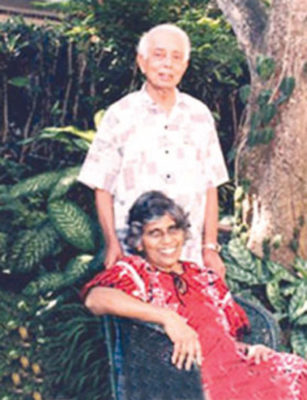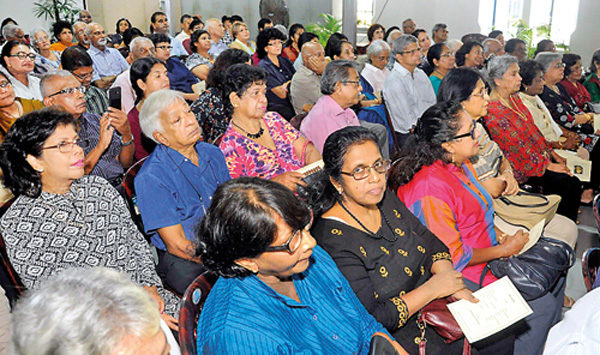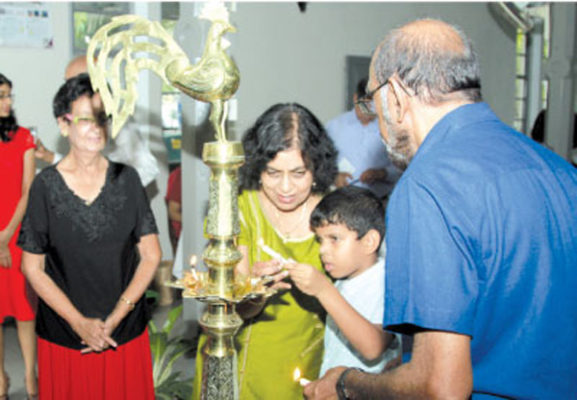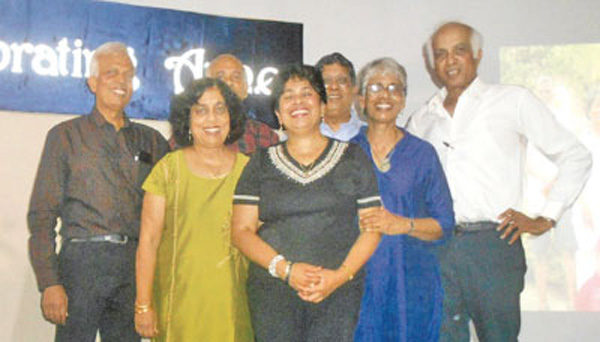The pen PROVED MIGHTY INDEED! – A Celebration of Anne Abayasekara, journalist and writer
On Saturday February 9, Cinnamon Gardens Baptist Church was host to a celebration of the work of the late Anne Abayasekara, Sri Lanka’s first woman to become a staff journalist and a much beloved writer over her career of nearly 70 years.
The evening proceeded with each of her seven children speaking about their mother, recounting fond memories of the sounds of her typewriter in the family home and sharing poetry she had written for her grandchildren; all to an audience of family, friends and people who had been, in some way, affected by Abayasekara’s work.
Pieces of writing were also read from a compilation of her essays and articles, entitled ‘Telling It Like It Is: Selected Writings Volume 1’. The collection, curated by her children, contains work from a prolific writing career beginning in 1947 and only ending with her passing in 2015.
The outpouring of appreciation following Abayasekara’s passing has been richly deserved. Her work was multi-dimensional and thoughtful, providing valuable insights for generations of readers, ranging from genres as diverse as political commentaries to marriage advice. Having reported on historic occasions such as Sri Lanka’s Independence celebrations as a young journalist at Lake House, Abayasekara’s work as compiled in ‘Telling it like it is’ also serves as a political and cultural history of Sri Lanka. Her articles representing snapshots of Sri Lankan life over the course of seven decades, captured through the lens of a perceptive and compassionate mind.

Anne with her husband Earle
In her writing Abayasekara was unwaveringly principled, addressing controversial questions of conflict and division in Sri Lanka, she spoke both reflectively and fearlessly of the many socio-political issues facing the country. In 1983’s ‘Are You Guilty of an Act of Omission?’, she writes of the horrors of Black July and the reluctance of the country’s political leaders and media to acknowledge the reality of the senseless racial violence that had occurred. She decries the lack of a response, writing of the victims, “No assurance has been given them that they will not suffer the same loss, or worse, again. There has been no public condemnation of the savage mobs which wreaked such havoc so swiftly. No one has said that such savage acts have no place in a dharmishta society.”

A section of the invitees. Pictures by Shan Rambukwella
Abayasekara’s work also promoted the rights of women in a time where this was far from usual in the press. For instance, in ‘Voice of Woman Demands to be Heard’, published in the Daily News in 1948, she reports on a meeting of the Eksath Kantha Peramuna. Here, Abayasekara championed grassroots emancipatory movements organised by and for working class women. She writes of her experience at the meeting “I looked at the women surrounding me and couldn’t help sensing the tremendous possibilities the expressive faces suggested… Other women’s movements have been born and died in this country, but it seemed to me that the Eksath Kantha Peramuna had a better chance of survival because the common woman was with them. And the voice of the common woman must sooner or later be heard.”

Anne’s great-grandson lighting the oil lamp

Anne’s Children (From L) Front : Ranmali, Anusha, Sarla. Second Row: Rohan, Ranil, Dilip, Ranjan
Her work also has a more personal component with many articles included in the book offering advice on issues such as marriage and family. This desire to offer help extended beyond her writing career, with Abayasekara also working as a professional counsellor in her later years.
A certain sincerity and natural good heartedness extend throughout her writing, with even her courageously direct political articles being somehow both uncompromising and empathetic. The accusatory tone in articles like ‘Are You Guilty of an Act of Omission?’ is intertwined with and is a result of, the deep compassion she felt for those suffering from grave injustice. She writes, “We have stood with Tamil friends beside the rubble of their homes. They don’t know where to turn or what to do. They are fearful, uncertain of the future and feel they can remain in Sri Lanka only at the risk of their lives.” Each of her political statements is deeply embedded in the lived human experience against which all political action is ultimately justified.
The high esteem that Abayasekara was held in was reflected in the words of the guest speaker, former Central Bank officer Dr Nimal Sanderatne who noted that “Anne’s life and work were unique, they reflect the conscience of a person deeply committed to ethical values and true patriotism. She was a courageous writer who in many of her writings expressed views that even the press refused to publish.”
In times of political uncertainty and societal strife, the kind of brave and humane writing that Anne Abayasekara produced, acts as both a mirror to a society’s ills as well as a voice of guidance in navigating the obstacles they create. Her contributions will be sorely missed.However, in the preservation of her writings, we have inherited a valuable moral compass which will assist us in our steps forward, such that we may in her words “build bridges of friendship that will unite all of us, whatever race or religion we profess, so that together, as Sri Lankans we can build a better tomorrow in this beloved land of ours”.








No Comments